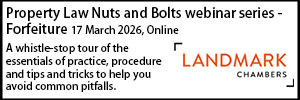Hopeless but not the same?
- Details
The High Court recently considered the scope of s70A Town and Country Planning Act 1990. Arevik Jackson looks at the lessons from the judgment.
Section 70A of the Town and Country Planning Act 1990 allows Local Planning Authorities to decline to determine a planning application, if certain conditions are satisfied.
The ultimate purpose behind the section is to prevent persistent, successive applications being pursued in relation to the same development on the same piece of land.
Whilst there is no right of appeal, a decision to decline to determine an application may be challenged by an application for a judicial review made to the High Court.
However, the scope for the Court’s interference is very narrow and confined to the usual judicial review principles, such as, for instance, if the decision can be demonstrated to be manifestly unreasonable.
Overall, the threshold for a successful challenge is very high.
The scope of the power has been recently considered in Paul Evans v Bridgend County Borough Council [2024] EWHC 2607 (Admin), 2024 WL 04534774.
On the facts, the Claimant in 2023 made two applications for outline planning permission for the construction of dwellings on the site.
One application was for the construction of nine dwellings on what was termed parcel A of the site. The other was for the construction of nine dwellings on the remainder of the site, referred to as parcel B.
The Defendant – the Planning Authority, declined to determine both applications pursuant to s70A TCPA 1990 on the basis that a similar proposal has recently been refused and dismissed on appeal (by Planning and Environment Decisions Wales).
The Claimant brought judicial review proceedings in respect of each parcel seeking on five grounds, orders quashing each decision, mandatory orders for the Authority to determine each application and damages.
His Honour Judge Keyser KC gave permission to bring the claims on just one ground:
‘That it was irrational of the Defendant to form the opinion, in each case, that the development and the land to which the application related were the same or substantially the same as the development and the land to which the 2021 application related.’
The 2021 application was an application for the development of the site for housing (the Claimant’s sixth such application with all the prior ones having been refused and two appeals dismissed). The 2021 application was also refused and dismissed on appeal.
The Authority refused the said application for a number of reasons, including due to it amounting to an overdevelopment, accessibility being in issue, there being no satisfactory means of access for generated traffic and a likelihood of U turns and because of the negative impact on the amenity of the area and biodiversity of the site.
At the appeal – the Inspector noted that the two prior appeals in respect of the site had been dismissed for similar reasons. Ultimately, the appeal was dismissed.
The Claimant pointed to several differences as between the 2021 and 2023 applications, whilst the Defendant’s evidence sought to explain why the applications were ‘similar’.
The Court said it was clear that the Defendant considered the two applications – as one. With reference to the relevant officer’s evidence, the Court noted:
‘…Indeed he considered that the division of the site was illogical and simply a ruse to circumvent the application of section 70A of the 1990 Act . He referred to this as an abuse of process. Taking the two 2023 applications together, such factors included the proposed land use, the illogical subdivision of the site, the outline form of the applications, the SINC issues, the serious access issues with no policy compliant solution, the similar number of dwellings, the design / amenity issues, and evidence showing the parcels in the 2023 applications being considered as one site. Such evidence included surveys in support of the applications which considered the site as a whole, for example surveys relating to topography, ecology, trees and bats.’
The Defendant’s evidence went further and set out what the Defendant’s officer considered as the impracticality of deciding the 2023 applications separately, which included, for instance, the absence of any coherent planning justification for the separation of the parcels and the view that no serious or realistic attempts had been made to overcome previous reasons for refusal.
The Court has referred to the relevant guidance:
‘17. Guidance, and it is only guidance, as to the implementation of the power set out above is given in Welsh Circular 44/91 (Welsh Office), Annex 2. At [5] it is stated that the government's intention behind the section:
"… is to prevent repeated planning applications from being used to wear down the resistance of local communities. Authorities should use the power only when they believe that the applicant is intending to exert pressure by submitting repeated similar applications."’
The officer’s statement did not expressly address the issue i.e. whether the Claimant in submitting the 2023 applications sought to exert pressure.
The Court said that the power to decline to determine can be appropriately used in cases where an applicant is misusing the right to apply for planning permission. It referred to R (on the application of Jeeves and Baker) v Gravesham BC [2006] EWHC 1249 [2006] J.P.L. 1743 and cited Collins J who dealt with the issue of similarity in this context:
‘So far as similarity is concerned, Mr Willers accepts, and rightly accepts, that he cannot argue that the applications are not similar. They are both, of course, for permission to site a residential caravan or caravans for the purpose of providing a home for gypsies. Of course, the details differ and the parties differ, but that does not prevent the applications being similar. The statute does not require them to be identical; it would clearly be an abuse of language to suggest that they were not similar.’
The Court considered R (Harrison) v Richmond-upon-Thames LBC [2013] EWHC 1677 (Admin) where Nicholas Paines KC sitting as a deputy High Court Judge said:
‘Mrs Harriet Townsend for Mr Harrison submitted, correctly, that this did not amount to a power to determine an application on the grounds that the local authority thinks the application will fail. To be clear, it is not the planning equivalent of a summary judgment dismissing a hopeless application. The section does not lead to the consequence that an applicant can never make a fresh application after a refusal, merely that he can be subjected to a moratorium of 2 years. Nevertheless, the merits are not wholly irrelevant. The background to the application of section 70A is that the application being considered under the section is similar to a previous application which was refused because of a lack of merit and the Circular refers at paragraph 4, for example, to undesirable developments and to the question of whether objections have been addressed.’
The Court also referred to Nicholas Paines KC observations in respect of the Circular applicable in England:
‘The clearest message I get from the Circular is that the power is to be used to counter repeated applications submitted with the intention of reducing opposition to undesirable development.’
It went on to find that none of the reasons put forward by the Defendant as to why it was not a practical possibility to consider each of the 2023 applications separately was good in law. It also found that the 2023 applications could and should have been addressed separately.
Agreeing with Mr Paines KC in Harrison the Court said that section 70A does not give the power to dismiss an application for planning permission on the basis that it is regarded as being hopeless.
The Authority’s evidence sought to address why certain aspects of the 2023 applications were in breach of national and local policies. These considerations focused upon the question of whether the applications were hopeless, rather than upon the relevant question of whether either of the applications is the same or substantially the same as one made in the previous two years and whether the claimant’s intention in submitting the 2023 applications was to exert pressure by submitting repeat applications.
The Court found that the high threshold of irrationality was met.
The decisions were quashed, and the Authority was ordered to determine the applications. However, the Court found no basis for the award of damages.
The case clearly demarks the concept of similarity from that of hopelessness and serves as a useful reminder of what s70A TCPA 1990 discretionary power is and, most importantly, what it is not, aimed at.
Arevik Jackson is a barrister at Kings Chambers.











































